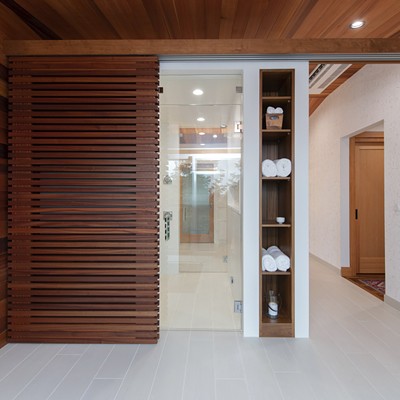The practice of medicine is more than seeing patients, it’s a commitment to the community,” says Dr. George Schneider, explaining the many hats he has worn since he entered the medical field as a pathologist in the 1950s. The health care community recognized his commitment with a few (more) awards in 2007, including the first-ever Lifetime Service Award from the Spokane County Medical Society and a Resolution of Appreciation from the Washington State Medical Association.
“I think they sort of over-did it,” he mutters, as lavish praise for his character and leadership is read aloud from the latter plaque.
A native of California educated in Oregon, Schneider moved to Spokane and became a founding member of Pathology Associates, a private laboratory. With one eye on the microscope and the other on the big picture of health care, he helped to establish a network of communication between hospitals and physicians around Spokane and the outlying rural communities.
“We realized the practice of medicine was within the community as a whole,” he says, “and that there were certain services that hospitals just couldn’t provide in laboratory medicine that were needed.” He and his partners traveled to small hospitals around the Inland Northwest every month, helping them become more efficient by determining which tests should be done locally and which should be outsourced.
Schneider served his residency in the Army, where he acquired expertise in blood banking and immunology. “Blood in the military is pretty important stuff,” he says, noting that World War II educated the entire country about the value of blood banks. Spokane’s blood bank — developed on a centralized model that provides collection and cross-matching services for the entire community — was facing some challenges in regard to timeliness, and Schneider began working with the medical director to resolve them. Due to his extensive knowledge of current developments in blood component processing, he was offered the medical directorship himself in 1969.
“He’s extremely knowledgeable and just keeps working until he gets all the information he needs,” says Judi Young, CEO of the Inland Northwest Blood Center (INBC). “He’s a visionary — you hear that term used a lot — but he’s just got such a long-term vision for health care in this state and even the country. He’s made a significant difference here.”
Schneider helped the blood bank to incorporate testing procedures for hepatitis in the 1970s and introduced the process of apheresis — by which blood components could be separated at the time of collection. He also helped expand the INBC’s role into that of a histocompatibility lab (HLA) for cross-matching organ tissue. “This allowed Dr. Icenogle to come here without trepidation when he started his heart and lung transplant program at Sacred Heart,” Schneider says.
“We recognized that we could do things at a blood center with less cost and higher quality than if they were done at diverse places,” Schneider says. “Why would Sacred Heart and Holy Family each need an HLA laboratory? If you put it all together in one spot, you can provide the service 24/7 with highly skilled people with nothing else to work on and provide high quality, fast service to the community when it needs it.”
Schneider also helped the INBC to develop its vastly complicated information system and to navigate the politically thorny issue of AIDS during the 1980s. The INBC’s new 58,000-square-foot facility is one of the most advanced of its kind in the nation, providing a broad range of laboratory services, including testing and cross-matching for the National Marrow Donor Program. The INBC is also developing a lab for processing blood stem cells taken from cancer patients, which are given back to them after chemotherapy to help their recovery.
“The strength of that blood bank is its wonderful staff,” Schneider says. “If you have good people with you, you give them the tools and the opportunity and it’s amazing what will happen.”
Schneider has served as president of the Spokane County Medical Society (SCMS) and the Washington State Medical Association (WSMA) — in the latter position, he used to “rattle the legislature down there [in Olympia] about access to care,” he says. “People couldn’t afford insurance and were showing up in emergency rooms, often too late. It was a mess and still is.”
In 1993, he was selected by Governor Lowry’s office to serve on the Washington State Health Care Services Commission where he was an outspoken advocate of universal access to health care.
“He bought a house in Olympia, threw himself into a thankless job and cheerfully bore a lot of criticism from people who thought this wasn’t something the state should do,” says WSMA CEO Tom Curry, who helped persuade Lowry to select Schneider. “He’s a man who can walk into a potentially explosive situation with different groups and take the edge off, appeal to their sense of reason and logic and help them understand that the issues are not about him: It’s about what’s good for the patient and the community.”
“It’s too bad that Washington state didn’t keep the program that they put into law (in the mid-1990s),” Schneider says. “We would have had a model that the United States could have used, and we wouldn’t be in the darn health mess that we’re in financially and service-wise. … By now, we would have saved close to $6 billion in health care services and everybody in the state would have been covered.
“It’s too bad it failed because of political confrontations,” he laments, noting that the commission’s work is now stuffed in 24 boxes and that money earmarked for the program’s development was tapped for sports fields in Seattle. “I guess sports is more important that human health,” he says.
Now 79 and a grandfather of 13 (and great-grandfather of three), Schneider is allegedly retired — a notion that draws skeptical chuckles from the administrative staff of the INBC, where he still serves as a volunteer board member.
“He still participates, and still has the desire to do what he can for his fellow physicians and the community he lives in,” says Jan Monaco, executive director of the SCMS.
As to his retirement, Schneider says: “You can call it a change of direction.”















